Germany’s future government of conservatives and centre-left Social Democrats have agreed a raft of measures to curb illegal migration, including rejecting asylum seekers, enabling deportations to Syria and suspending family reunions.
Asylum seekers will be refused entry along all of Germany‘s borders, the document said, and the policy of ‘turbo-naturalisation’ – allowing certain migrants to gain citizenship after just three years of stay – will be abolished.
The parties want to suspend family reunification for people with a so-called subsidiary protection status for two years and to end all federal admissions programmes for refugees.
The coalition government, which will be led by Chancellor-in-waiting Friedrich Merz from the conservative CDU/CSU bloc, will also begin deportations of migrants to Syria and Afghanistan, according to the coalition agreement document.
The agreement said that a deportation programme would start by removing criminals and potentially dangerous persons.
The proposed crackdowns come off the back of a tightly contested election in which migration was a key issue following a rise of the far right and several high-profile attacks by migrants.
As Merz’s conservative CDU/CSU bloc settled on a coalition with the Social Democrats (SPD) yesterday, Germany’s far-right AfD party topped a major poll for the first time in a sign of growing dissatisfaction with mainstream parties.
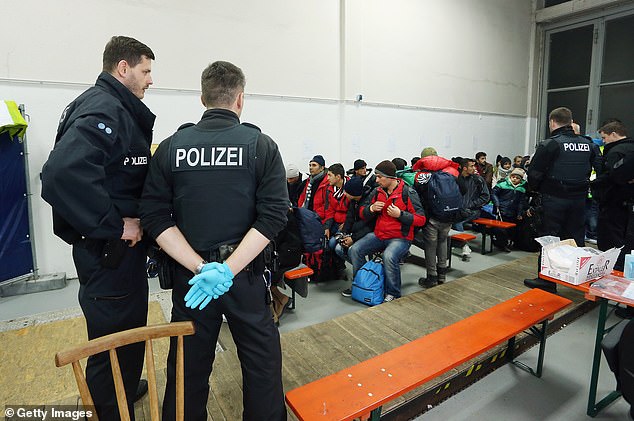
Migrants and refugees arriving from Austria wait to be registered at a processing centre in Germany
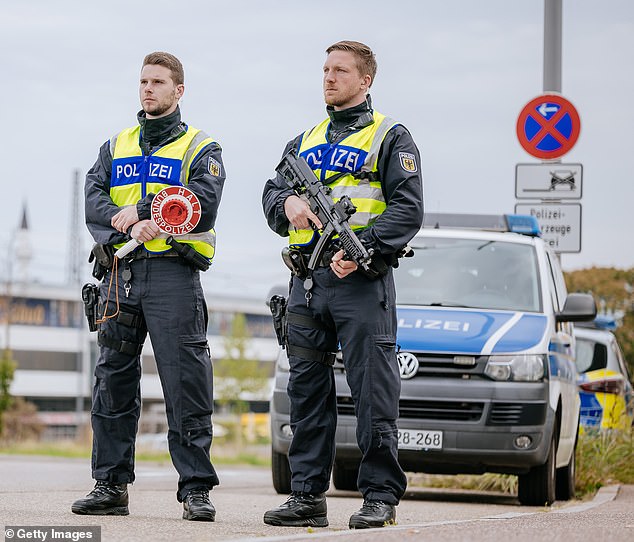
German police check people arriving from France at the German-French border on September 16, 2024 in Kehl, Germany
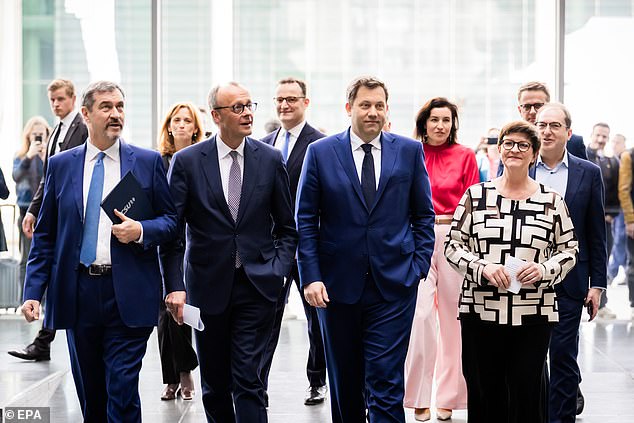
(L-R) State Premier of Bavaria Markus Soeder, Chairman of the Christian Democratic Union (CDU) party and faction Friedrich Merz, Social Democratic Party (SPD) co-chairman Lars Klingbeil and SPD co-chairwoman Saskia Esken arrive for a press conference to present the joint coalition agreement in the German Bundestag, in Berlin, Germany, 09 April 2025
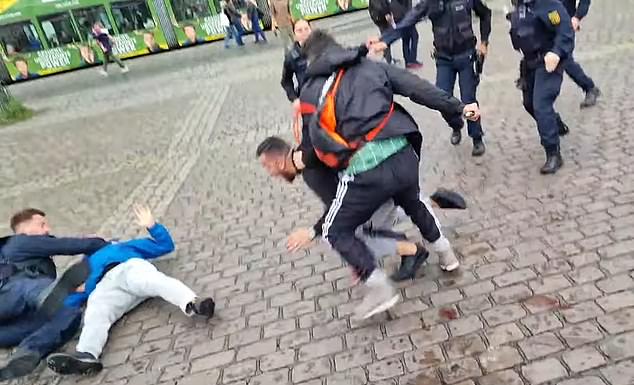
The proposed crackdowns come off the back of a tightly contested election in which migration was a key issue following a rise of the far right and several high-profile attacks by migrants
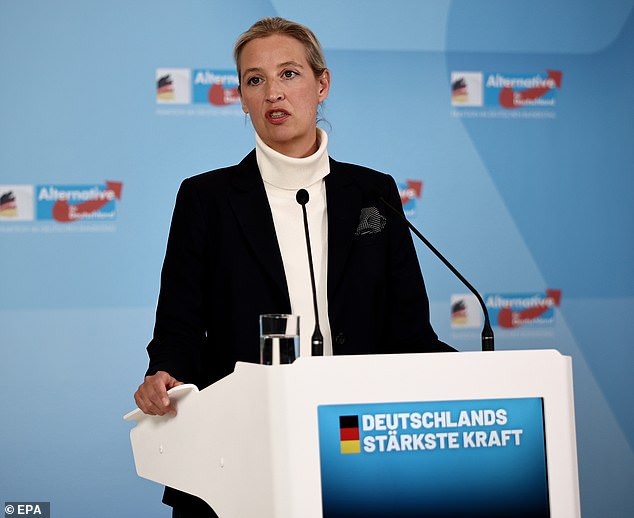
German party Alternative for Germany (AfD) co-chairwoman Alice Weidel speaks in Berlin, Germany, 09 April 2025
Support for the CDU/CSU, which won the February 23 election, fell by five percentage points to 24% while the Alternative for Germany (AfD) gained three points to land on 25%, according to the Ipsos Institute’s poll.
The AfD came second in the election, the best performance by a far-right party since World War Two.
Its polling strength is a setback for Merz’s conservative alliance, which wanted to win back voters from the party.
The Ipsos poll showed support for outgoing Chancellor Olaf Scholz’s Social Democrats (SPD) unchanged at 15%.
AfD leader Alice Weidel hailed her party’s polling breakthrough in a post on X. ‘The people want political change – and not a ‘business as usual’ coalition of CDU/CSU and SPD,’ she wrote.
For now, though, the AfD have been frozen out by those parties.
Merz and his new government look likely to take office at the beginning of May, with the deal between his conservatives and the SPD capping off weeks of haggling between the two groups.
Besides the tough stance on migration, the coalition aims to revive growth in Europe’s largest economy just as US President Donald Trump looked set to ignite a global trade war.
During a news conference with his coalition partners, Merz directed a message to the White House in English.
‘The key message to Donald Trump is Germany is back on track,’ he said, promising to ramp up defence spending and boost the competitiveness of the economy.
He said the coalition pact provided a ‘strong and clear signal’ both to its own citizens and other European countries, adding, ‘Germany is getting a government that is capable of action and strong.’
The deal stressed the importance of Germany’s relations with the United States, its largest trading partner, and aims for a free trade deal in the medium term.
But Merz also emphasised that the European Union needed a common response to the escalating global tariff war that has put the US and China in particular at loggerheads.
‘At the same time,’ Merz said, ‘economic uncertainty is increasing enormously. This week in particular, decisions by the American government have triggered new turmoil.’
Hours later, Trump announced a 90-day pause to the tariffs, a result that Merz claimed was a success for Europe’s united approach to trade policy.
‘This example shows you: unity helps,’ he told RTL television, adding that cutting transatlantic tariffs to 0% would ‘solve the problem’.
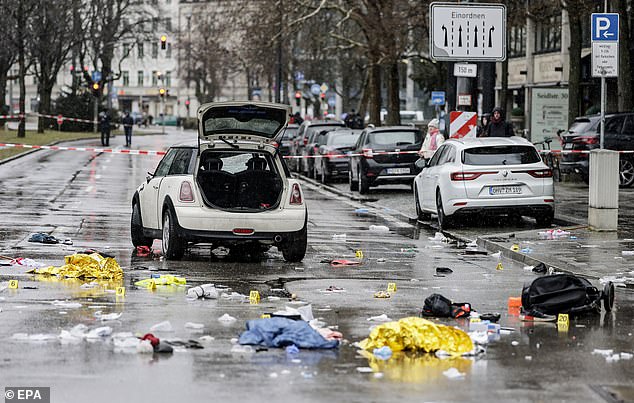
A general view shows the scene after a vehicle was driven into a demonstration in Munich, Germany, 13 February 2025
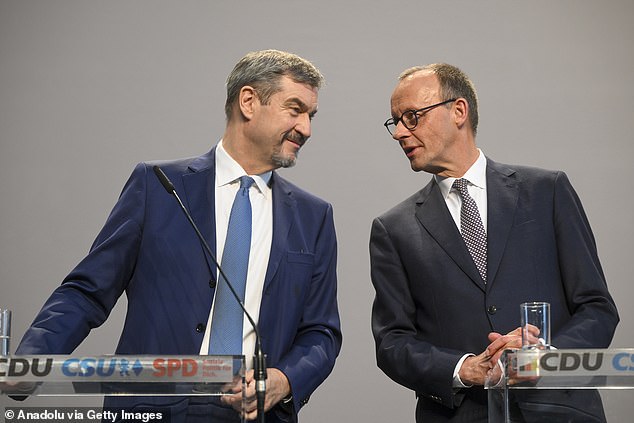
Friedrich Merz (R), leader of the Christian Democratic Union (CDU), Markus Soder (L), leader of the Christian Social Union (CSU), speak ahead of their agreement of a coalition with the SPD
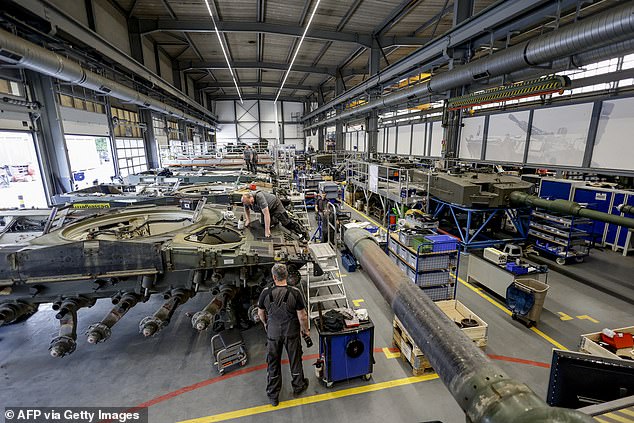
Technicians of German armaments company and automotive supplier Rheinmetall assemble a Leopard 2A4 battle tank
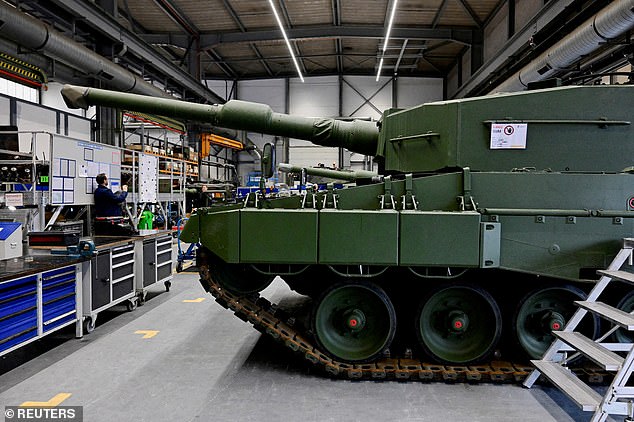
Merz, who has been a staunch proponent of European rearmament in the wake of the Russia-Ukraine war, also announced that Germany would roll out a voluntary military service programme
Outlining a raft of policies, the coalition agreed to cut taxes for middle and lower incomes, to reduce corporate tax, lower energy prices, support the electric car industry and scrap a disputed supply chain law.
It also plans a commission on further reforming Germany’s constitutionally enshrined spending limits known as the ‘debt brake’, long seen by critics as hobbling economic growth.
‘All of this is going in the right direction, but it is not a real restart in economic policy that would be necessary in view of the competitiveness that has been eroding for years,’ said Joerg Kraemer, chief economist at Commerzbank.
Merz, who has been a staunch proponent of European rearmament in the wake of the Russia-Ukraine war, also announced that Germany would roll out a voluntary military service programme and create a national security council, as well as moves to speed up defence procurement and backing Ukraine’s bid to join the NATO alliance.
It comes as European nations scramble to boost their defence manufacturing capabilities amid concerns that the US under Trump could withdraw military support from the continent.
Meanwhile, Britain and France are convening a meeting of defence ministers from around 30 countries today to press ahead with plans to deploy troops to Ukraine to police any future peace agreement with Russia.
The meeting at NATO headquarters – the first between defence ministers representing the so-called coalition of the willing – comes after a visit to Kyiv last week by senior British and French military officers.
It’s expected to work on fleshing out an agreement reached at an earlier meeting between leaders.
As usual with coalition gatherings, the United States will not take part, but the success of the coalition’s operation hinges on US backup with airpower or other military assistance.
Amid that uncertainty and US warnings that Europe must take care of its own security and that of Ukraine in future, the force is seen as a first test of the continent´s willingness to defend itself and its interests.
Its makeup will depend on the nature of any peace agreement, but the contingent is unlikely to be stationed at Ukraine’s border with Russia.
It would be located further from the ceasefire line, perhaps even outside Ukraine, and deploy to counter any Russian attack.